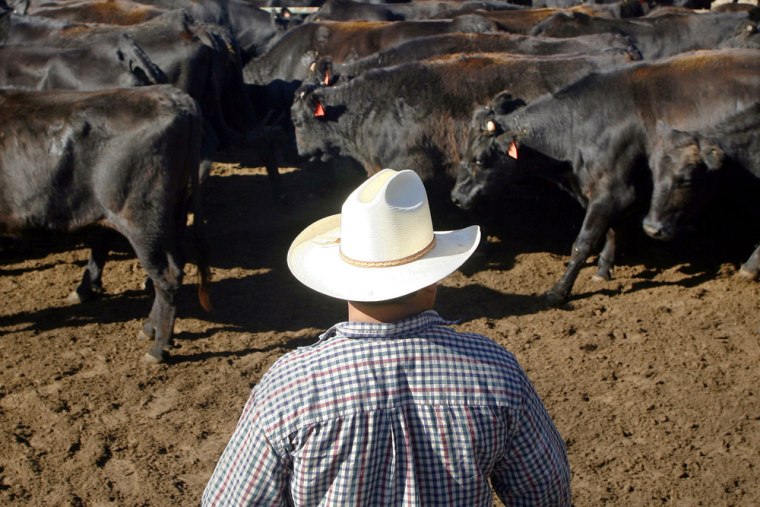For the first time in four years, a gourmet extravagance — authentic Japanese Kobe beef — is allowed back into the United States.
The question is whether anyone will care. An American "Kobe-style" brand has taken its place on restaurant menus.
"We cannot meet demand," said Todd Hatoff, president of Allen Brothers, which sells high-end beef to fine restaurants. "I don't see it going away, ever. It's not a fad."
Kobe beef is the essence of fine dining: The meat bursts with flavor, and the fat melts like butter and coats your mouth with velvety richness. The best American Kobe-style steak will cost $80, $90, even $100 at a high-end steakhouse. A Kobe-style hamburger can run $40.
It tastes good because of the fat. The meat is streaked so thickly with fat, the Japanese call it "white steak." When it's cooked, the fat melts into the meat, infusing it with flavor.
"It's very rich, very full-flavored," said Tom Schneller, assistant professor at the Culinary Institute of America. "This is the cream of the crop."
Legend has it that Japanese Kobe cattle are fed beer, massaged with sake, even soothed with soft music. Experts say beer has been used to stimulate their appetites and that sake makes for a glossy coat, on which they are graded.
But that is not how it's done in America, where ranchers believe good genetics and careful feeding are the main ingredients for quality Kobe-style beef.
"It's a great story, and we don't go out of our way to dispel the myth, but it's really not necessary," said Jay Theiler, president of Idaho-based Snake River Farms. "The two things that make Kobe-style beef are genetics and a long feeding program."
It starts with the cows. True Kobe beef comes from the region surrounding the city of Kobe. For centuries, the cattle was used not for meat, but to provide the muscle for rice cultivation. Consumption didn't really take off until after World War II.
The American version of Kobe beef comes from the same breed of cattle raised in Japan. Called Wagyu, a Japanese name that means "Japanese cattle," they began arriving in the United States in the 1990s, often aboard airplanes.
They are fattened for much longer than the average American breed — they live about 26 to 32 months, compared to 18 months for U.S. beef cattle. U.S. ranchers often crossbreed them with Angus cattle.
The beef they produce is considered better than prime — the highest grade given by the U.S. Department of Agriculture. Prime is for meat that is abundantly marbled with fat. Restaurants and hotels get most of the country's prime beef; only a small amount is sold in supermarkets.
Texas cattleman Gary Yamamoto says at least 97 percent of his Kobe-style Wagyu beef is prime. Nationwide, only about 2 percent of beef earns a prime rating.
The glossy black cows and calves grazing on Yamamoto's gently rolling hills look like any other beef cows. It's hard to tell the full-blood Wagyu cattle apart from Angus cows that Yamamoto uses for crossbreeding.
He started with a small herd, 88 cows and 10 bulls, bought from a Japanese rancher. The rancher, Shogo Takeda, had flown them to the U.S. so he could sell embryos and calves more easily to Australia, another country where Kobe-style beef is flourishing.
Yamamoto wound up buying the entire herd in 1999; Takeda still advises him and visits his ranch, which is about 55 miles southeast of Dallas.
Yamamoto, a Japanese American, is not a typical rancher. He's a professional bass fisherman with a thriving custom lure business. He drives around his ranches with a chihuahua nestled in his lap.
While cattlemen can be private about their operations, Yamamoto chats freely — confiding, for example, that the whole thing began because he was looking for a property tax break that comes with grazing livestock or planting trees.
"Once I got into it and learned all the aspects — the health as well as the good taste, I was hooked," Yamamoto said.
Healthy beef? Healthy fatty beef? Absolutely, Yamamoto says — he helped fund research that backs up his claim. A Texas A&M University researcher, Stephen Smith, concluded that compared to American beef, Wagyu beef is much higher in unsaturated fat. It has high levels of oleic acid, the fatty acid in olive and canola oils that has been shown to lower bad LDL cholesterol.
"The health aspect of this animal is what should be the standard for the U.S. cattle herd," Yamamoto said. "If I can put these bulls on any breed and decrease the saturated fat, that would be the standard."
Another selling point for Kobe-style beef is that it's often raised without hormones or antibiotics.
Still, some ranchers think indulgence is the biggest selling point.
"Most Americans live with a cloud; they all know what is right and the way they should live their lives," said R.L. Freeborn, president of Oregon-based Kobe Beef America. "This is a fine dining experience. Something like a fine steak is really, really a joy to eat."
The U.S. banned Japanese beef after mad cow disease was discovered there in 2001. Officials ended the ban earlier this month, after Japan ended its own embargo on American beef.
However, the Japanese won't be sampling American Kobe-style beef, because it takes longer to raise than the 21-month age limit Japan has imposed on beef it imports from the United States.
There are no such limits on imports of Japanese Kobe beef. Still, U.S. ranchers have spent four years getting a foothold on the market.
"Just as California wines have taken off, I think you have very good cattlemen here in the U.S. that know how to raise cattle," Schneller said.
